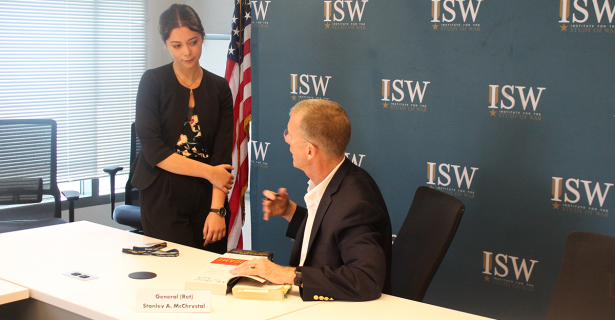During my first six weeks as a research intern in Washington D.C, I had the opportunity to co-author a piece on Turkey at the Institute for the Study of War (ISW). With such exciting news, I concluded the first half of my summer to participate in the two-week Hertog War Studies Program, run by ISW. The program started with a welcome dinner on July 19 for all 20 participants and our lecturers.
The War Studies Program was created in 2013 to enhance the dialogue between civilians and the military on national security, military history, and intelligence. For that, a big portion of our curriculum focused on military theory and history. We read hundreds of pages every night on thinkers like Clausewitz and Moltke as well as on the Battle of Austerlitz during the Napoleonic Wars, the Schlieffen Plan during World War I, and on military developments like the invention of railroads and aircraft. Our classes were often focused on critically analyzing theories and battle strategies, discussing levels of war and chaos theory, and analyzing more recent conflicts such as the first Gulf War and U.S. invasion of Iraq after 2003.
As a student majoring in international relations at Tufts, I usually feel comfortable discussing and learning about history and the politics of the Middle East or talking about Turkish politics for countless hours. However, studying military doctrine and using military lexicon were initially very challenging and unfamiliar. War Studies was all about pushing you out of your intellectual comfort zone to discuss military theories and strategies in class every day.
Adding to the rigorous curriculum, we had amazing guests ranging from retired U.S. Military generals to diplomats over the course of two weeks. Beyond listening to their various experiences and perspectives on international security, we were able to meet and get advice from people in various positions in policymaking in Washington D.C.
The most rewarding aspect of the program was sharing a classroom with my amazing, smart, and intellectually curious colleagues. As a student from Turkey, it was exciting that the program had gathered college students with various academic backgrounds from engineering to international relations from all over the world, including the U.S, the U.K, Hungary, and Australia. Every student was there to bring a new perspective to the table. Conversations often ranged from discussing anything from Chaos Theory to understand nature of war to the firearms technology of 19th century.
It was one of the most intellectually challenging things I have done in my college years. This experience has pushed me out of my intellectual comfort zone, and I would recommend it to anyone studying international or national security. I will be returning to my internship with a much better understanding of my research topics and areas. Looking forward to my last three weeks in Washington D.C.!

